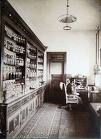Alfons Beck 1808 -1894
October 09, 2009
 Alfons Beck 1808? -1894? was a
German orthodox physician who converted to homeopathy
Alfons Beck 1808? -1894? was a
German orthodox physician who converted to homeopathy
Alfons Beck was a colleague of Carl Bojanus, Anton von Hubbenett, Osip Lensky, Carl Frantz Dominik von Villers,
Carl Frantz Dominik von Villers’s son Alexander contracted diphtheria and was successfully treated with homeopathy by Alfons Beck. Thus, Alexander von Villers is the first person cured with Mercury Cyanatus. Thirty years after this cure, Alexander von Villers and Alfons Beck attended the same conference and spoke on the same platform.
From http://homeoint.org/books4/kotok/1300.htm Alexander Kotok, M.D., The history of homeopathy in the Russian Empire until World War I, as compared with other European countries and the USA: similarities and discrepancies, (On-line version of the Ph.D. thesis improved and enlarged due to a special grant of the Pierre Schmidt foundation 2001). The journal Vestnik noveishih vrachebnyh metod (The Herald of New Medical Methods) which was published in St. Petersburg in the early 1860s, published in 1862 a very interesting document deserving a special study.
The document was A program for a clear persuasion of the efficiency of the homeopathic method and of the possibility for homeopathy to be accepted as a medical art, signed by Profs. Kozlov and Zdekauer… Carl Bojanus cited the whole “Program” and the answers of homeopaths.
This program began with an unquestionable assertion: Common sense has convinced everybody that a doctor needs the two following conditions in order to successfully treat diseases:
- The ability to make the right diagnosis of the disease, and to promote the right treatment based upon this diagnosis.
- Applying the needed medicines at the appropriate time, which enables them to have their effects with the steady and exactly expected actions, during the time and to the extent […] defined by the doctor.
Thus, from the very first words one can understand that Prof. Zdekauer and Kozlov, even if they wished to discuss the theme seriously, were prepared to speak with homeopaths while staying on purely allopathic soil (location of disease in the body, actions of the medicines as expected in time and effect), which, in their opinion, “represented the essence of the medical art”.
The professors were trying to get the answers to the following points:
- How do homeopaths locate the injured places in the body?
- How can one treat, according to homeopathy, different diseases presenting similar symptoms?
Although the “Program” occupies 10 pages in the book of Carl Bojanus, these were mostly questions on the ability of homeopathy to treat this, that or another disease. The authors finished writing their “Program” in a way that hardly harmonized with the minor tone in which the document was written at the beginning:
Clear and tangible experiments have to prove that homeopathy possesses medical action, enabling the fulfillment […] of the aims […] subordinated in time and power to the will of the doctor […]. Only in this way would one achieve the conviction that homeopathy may be permitted, together with rational medicine, for the good of mankind.
Otherwise, it should be decided that homeopathic treatment of diseases, provided not only by laypeople but also by doctors, is a public evil, should be prohibited. Four homeopathic physicians, Anton von Hubbenett, Carl Bojanus, Alfons Beck and Carl Frantz von Villers reacted to the “Program” in Zhurnal gomeopaticheskogo lecheniia…
“I shall limit myself to several central points in those answers. All the homeopaths stressed that the authors of the “Program” had no intention to discuss homeopathy on the grounds of homeopathic theory and practice; instead of that they proposed carrying out only those experiments which are acceptable for the allopathic school.
“Every experiment arranged outside the homeopathic doctrine […] has been a priori deficient and has no significance. In order to support a scientific denial of homeopathy from experiments, one should base this denial on homeopathic experiments. Otherwise, this [denial] cannot be considered fair.”
They also pointed out that it is not a secret that allopathic and homeopathic methods of diagnosis and treatment are different; it is not clear what the professors expected from homeopathy, whereas even within allopathy there was no full fledged unity in the treatment of various diseases, whilst the polypharmacy had become the most serious problem of allopathy.
Alfons Beck, whose answer was the most detailed, argued that although the exact definition of a disease’s location has been difficult for homeopathy as well as for allopathy, this does not create an obstacle to a successful homeopathic treatment, while for allopathy the lack of localization is an insuperable barrier.
He also proposed an experiment to prove the effect of homeopathic medicines on healthy persons according to Samuel Hahnemann’s method. One could moreover establish a homeopathic hospital, in which a committee of allopathic doctors might be observers and make judgments without being involved in the treatment.
Other homeopaths proposed nothing but only answered the questions. No development of the discussion followed.
As to the results of this discussion, Carl Bojanus wrote in 1882: “Twenty years will be too short for homeopaths to obtain a reaction […] to their answers and proposals. Why the discussion was proposed [by allopaths] at all? We leave this question open…